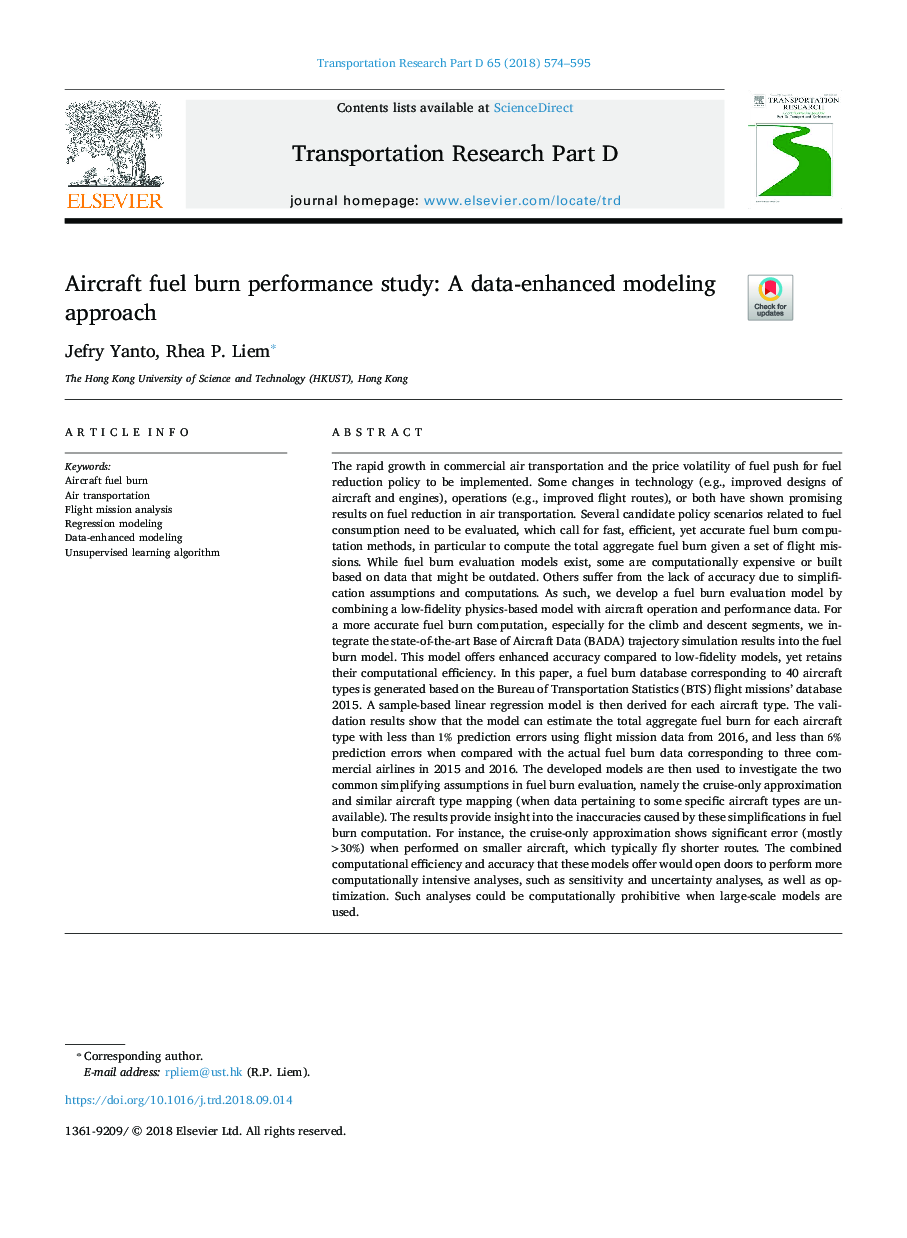| کد مقاله | کد نشریه | سال انتشار | مقاله انگلیسی | نسخه تمام متن |
|---|---|---|---|---|
| 11005456 | 1485859 | 2018 | 22 صفحه PDF | دانلود رایگان |
عنوان انگلیسی مقاله ISI
Aircraft fuel burn performance study: A data-enhanced modeling approach
ترجمه فارسی عنوان
بررسی عملکرد سوخت سوخت هواپیما: رویکرد مدل سازی پیشرفته داده
دانلود مقاله + سفارش ترجمه
دانلود مقاله ISI انگلیسی
رایگان برای ایرانیان
کلمات کلیدی
سوخت سوخت هواپیما، حمل و نقل هوایی، تجزیه و تحلیل ماموریت پرواز، مدل سازی رگرسیون، مدل سازی پیشرفته داده الگوریتم یادگیری بی نظیر،
موضوعات مرتبط
علوم زیستی و بیوفناوری
علوم محیط زیست
علوم زیست محیطی (عمومی)
چکیده انگلیسی
The rapid growth in commercial air transportation and the price volatility of fuel push for fuel reduction policy to be implemented. Some changes in technology (e.g., improved designs of aircraft and engines), operations (e.g., improved flight routes), or both have shown promising results on fuel reduction in air transportation. Several candidate policy scenarios related to fuel consumption need to be evaluated, which call for fast, efficient, yet accurate fuel burn computation methods, in particular to compute the total aggregate fuel burn given a set of flight missions. While fuel burn evaluation models exist, some are computationally expensive or built based on data that might be outdated. Others suffer from the lack of accuracy due to simplification assumptions and computations. As such, we develop a fuel burn evaluation model by combining a low-fidelity physics-based model with aircraft operation and performance data. For a more accurate fuel burn computation, especially for the climb and descent segments, we integrate the state-of-the-art Base of Aircraft Data (BADA) trajectory simulation results into the fuel burn model. This model offers enhanced accuracy compared to low-fidelity models, yet retains their computational efficiency. In this paper, a fuel burn database corresponding to 40 aircraft types is generated based on the Bureau of Transportation Statistics (BTS) flight missions' database 2015. A sample-based linear regression model is then derived for each aircraft type. The validation results show that the model can estimate the total aggregate fuel burn for each aircraft type with less than 1% prediction errors using flight mission data from 2016, and less than 6% prediction errors when compared with the actual fuel burn data corresponding to three commercial airlines in 2015 and 2016. The developed models are then used to investigate the two common simplifying assumptions in fuel burn evaluation, namely the cruise-only approximation and similar aircraft type mapping (when data pertaining to some specific aircraft types are unavailable). The results provide insight into the inaccuracies caused by these simplifications in fuel burn computation. For instance, the cruise-only approximation shows significant error (mostly >30%) when performed on smaller aircraft, which typically fly shorter routes. The combined computational efficiency and accuracy that these models offer would open doors to perform more computationally intensive analyses, such as sensitivity and uncertainty analyses, as well as optimization. Such analyses could be computationally prohibitive when large-scale models are used.
ناشر
Database: Elsevier - ScienceDirect (ساینس دایرکت)
Journal: Transportation Research Part D: Transport and Environment - Volume 65, December 2018, Pages 574-595
Journal: Transportation Research Part D: Transport and Environment - Volume 65, December 2018, Pages 574-595
نویسندگان
Jefry Yanto, Rhea P. Liem,
